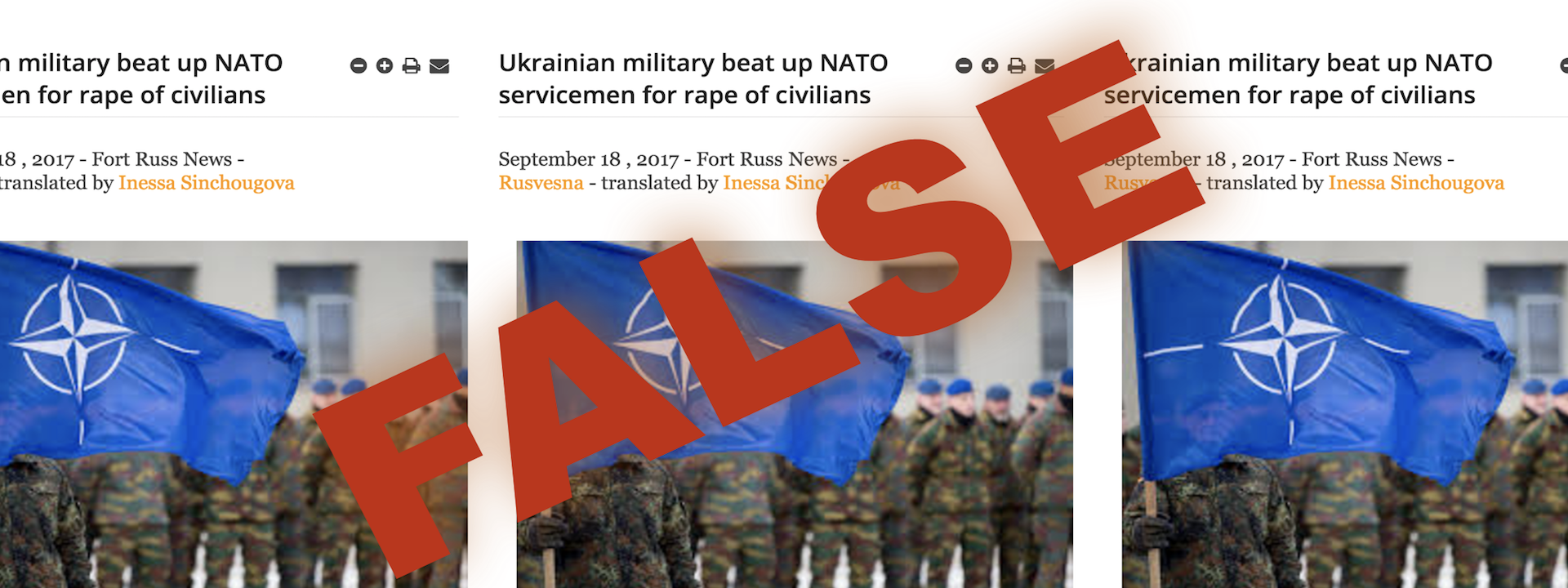#FakeNews: A Lithuanian “Lisa” Case
How a fake story was used to turn Ukrainians against Lithuanians and NATO
#FakeNews: A Lithuanian “Lisa” Case

How a fake story was used to turn Ukrainians against Lithuanians and NATO

At a press conference on September 18, a representative of the pro-Russian “Luhansk People’s Republic,” Colonel Andrej Marochko, claimed that three Lithuanian military instructors serving in eastern Ukraine raped two underage girls in the village of Teploe, Luhansk district.
The story was false. We investigated.
https://www.youtube.com/watch?v=tBsnpkgyjsI
Colonel Marochko claimed the incident took place on September 12. He claimed the local police advised both victims to “keep their mouths shut.” According to Marochko, it upset the locals and “individual Ukrainian Armed Forces servicemen” resorted to violence against the accused Lithuanian instructors.
Col. Marochko concluded that this incident “indicates the true essence of foreign aid to the criminal regime in Kiev, bringing ‘order’ to Donbass through the genocide of its local population.”
Again, the story Col. Marochko refers to is false. Lithuania bases its military instructors in western Ukraine and it has no presence in the Anti-Terrorist Operation (ATO) zone in the east. The Ukrainian Defense Attaché in Lithuania, Oleksandr Koberskyj, confirmed this in an interview with Delfi.lt: “
There are currently 60 Lithuanian soldiers in Ukraine, but they are located in western and central districts of the country and there are no Lithuanian or other NATO members’ servicemen in the ATO operation zone in Ukraine’s southeast.
Additionally, there is no evidence of locals assaulting any Lithuanian military instructors in eastern Ukraine.
Despite this, Russian mainstream and Kremlin-aligned English-language fringe media picked up the story. Immediately after Col. Marochko’s press conference, some of the largest Russian media outlets, including Komsomolskaya Pravda (KP) Donetsk, 5-TV, Regnum, Rusvesna, and TopNews.ru picked up the story about the alleged rape. It quickly trickled down to smaller media outlets, including real-info.info, nashagazeta.net, rodinabg.com, lug-info.com, Movivu.com, Politnavigator.net, Aftershock.news, news.sputnik.ru, 123.ru, mirovaja.ru, shock.ee, belrynok.ru, and kznam.ru.
Interestingly, the different media outlets chose to focus on different identities of the accused “rapists.” For example, KP and Rusvesna identified the alleged rapists as “NATO-ists,” whereas Regnum and TopNews refer to them as Lithuanians or foreign mercenaries in their headlines. It suggests the different iterations intends to discredit two perceived adversaries — Lithuania and NATO — with one fake story.
The fake quickly moved from a baseless rape allegation to a full-scale “news story” on Lithuania and NATO’s involvement in Ukraine, revealing the true intention behind the narrative.
Real-info.info, Nashagazeta.net, Lug-info.com, and rodinabg.com to name a few, all quoted Col. Marochko’s inflamatory conclusion that this incident highlights an example of foreign-powers committing “genocide” against the people of Donbas.
Others, like Komsomolskaya Pravda (KP) used highly inflammatory language to stoke tensions even further. The description under the header image used in the KP article read, “Lithuanians do not see Donbas citizens as people.”

English translations of some articles followed shortly after the story started making rounds in Russian information space. Fort-russ.com re-published the first English translation of one of the articles. It published a translation of the Rusvesna article. The outlets TheRussophile.org and News31.eu also published copies of this article.
The story does not appear to have had a significant impact. A Buzzsumo scan shows that the various copies of the story received up to 600 shares, mostly on Facebook.

The story failed to penetrate Lithuanian information space as major media outlets published well-sourced stories about the story’s fictitiousness.
This baseless story strongly resembles the Lisa case, in which Russian media and high-ranking political figures accused the German authorities of failing to investigate the rape of an underage Russian-German girl named Lisa. The story continued long after the Berlin police confirmed it was fake. It still serves as a useful case study to show the Kremlin’s ability to mobilize foreign populations under false pretenses to protest their own governments and institutions.
Colonel Marochko’s story used similar means, seeding the story in the Russian language information space and sowing distrust, this time between the Ukrainian people and NATO, Lithuania, and the ATO forces in the east. The fact that it failed to gain any significant traction shows the increasing resilience of Ukrainian and Lithuanian societies to disinformation.
Follow along for more in-depth analysis from our #DigitalSherlocks.

